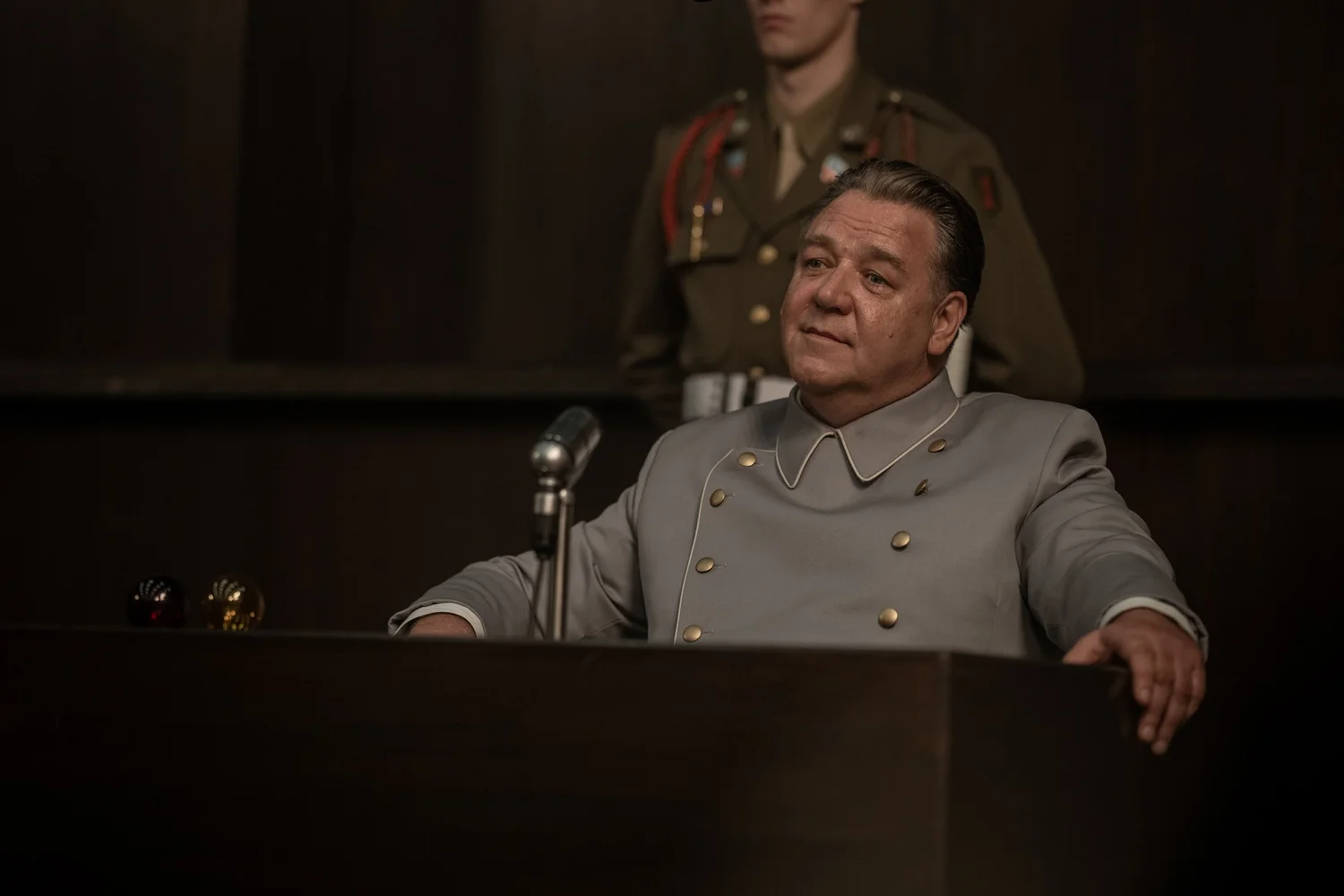Images courtesy of Sony Pictures Classics
NUREMBERG— 3 STARS
For those who know their history, the setting and subject matter of Nuremberg are as serious as a heart attack. Director James Vanderbilt’s film dramatizes the unprecedented tribunal convened by the victorious Allied forces against the apprehended and surviving top brass of the German Nazi party. Filmed by the media for the international public to see, the evidence shown at the trial was, for many, their first glimpses of the concentration camp horrors of the Nazi’s “Final Solution to the Jewish Question.” With that kind of far-reaching and impactful veracity at its center, tone choice is everything for a movie like Nuremberg.
LESSON #1: CHOOSE YOUR APPROACH— Unlike Stanley Kramer’s much-lauded Judgment at Nuremberg from 1961, which took a more fictional/composite direction, this film uses as many real figures as possible. Even so, there’s plenty of pendulum space for a courtroom drama of this subject matter to veer somewhere between respectful and exasperating. James Vanderbilt had a choice, and he, as an experienced and successful screenwriter known best for his gaudy action flicks, perked up Nuremberg with a little pump and pomp. The result makes what would normally be wearisome moderately engrossing.
Reserving the courtroom theatrics for the third act, Nuremberg spends the majority of its narrative on the pre-trial moods and preparations of the historical participants involved. Out of the many Wikipedia namedrops possible to shuffle, Vanderbilt, adapting Jack El-Hai’s 2013 novel, The Nazi and the Psychiatrist, focuses on one mental chess match that occurred behind the scenes. Granting itself a plateau of showy importance, Nuremberg pits two Academy Award Best Actor winners who are more than worth the price of admission for this barb-filled and principle-slinging verbal duel.
Gladiator legend Russell Crowe plays Reichsmarschall Hermann Göring, the Commander-in-Chief of the Luftwaffe and the head of the Nazi Party. Göring is the centerpiece of the first Nuremberg trials after surrendering to U.S. military forces in Austria a week after the suicide of Adolf Hitler in May of 1945. He and 21 other defendants are kept under a close and interrogative watch at the “Ashcan” prisoner-of-war camp housed inside a Luxembourg luxury hotel under the command of Col. Burton C. Andrus (professional red ass John Slattery).
Tasked with examining and interviewing Göring and his fellow high-ranking Nuremberg prisoners is United States Army Medical Corps chief psychiatrist Douglas Kelley, played by Bohemian Rhapsody Oscar winner Rami Malek. Being granted access to some of the most anomalous architects of propaganda and evil societal influence in human history intrigues the cocksure Dr. Kelley, who sees a profitable best-selling novel coming out of this experience. Paired with the German-American translator, Sgt. Howie Triest (The White Lotus ensemble member Leo Woodall), Douglas looks to gain the narcissistic Hermann Göring’s confidence.
Orbiting outside of the prison cell conversations is the increasing legal preparations. The Nuremberg trials are the political baby of Supreme Court Associate Justice Robert H. Jackson (Oscar nominee Michael Shannon, no slouch in the confrontation department himself when necessary). He’s been appointed by President Harry Truman as the U.S. Chief of Counsel, supported by intelligence office John Amen (actor-director Mark O’Brien) and lead British counsel, David Maxwell Fyfe (Richard E. Grant, another Oscar winner). Not above breaking doctor-patient confidentiality to win the all-important trial, Jackson becomes highly interested in what Kelley can learn from Göring for their advantage in court.
LESSON #2: DISSECTING EVIL— Russell Crowe has the unenviable task of playing the proverbial arrogant and uncaring monster in Nuremberg. Folks forget that most “monsters” who reach Hermann Göring’s level of power are highly intelligent, not always the ill-informed blustering maniacs we make them out to be. It’s not about creating sympathy for the villain to sew doubt into the courtroom drama. Rather, Nuremberg holds firmly on to its often spine-tingling dissection of evil. That path is suspenseful in its own right.
The hold Russell Crowe exhibits over his scene partners in Nuremberg puts everyone else on their heels, and these are not easy actors to jostle. The Aussie—occupying a sturdy frame of authority and powerful charisma that harkens to the likes of Orson Welles and Sydney Greenstreet in his best role in years—drips with the necessary chilling menace to make you shiver, yet still hang on his every word. His signature husky voice and stern composure convincingly keep you guessing until the end how much he is possibly toying with Douglas Kelley and Robert H. Jackson. Rami Malek asserts himself nicely from his sometimes sinking perch on the moral high ground to go script-to-script with Crowe.
James Vanderbilt, who gained his Hollywood standing penning the smashes and explosions of The Amazing Spider-Man, White House Down, and the abysmal Independence Day: Resurgence, infuses Nuremberg with a questionable injection or two of brash polish. Regular Ridley Scott cinematographer Dariusz Wolski can’t help but make every angle bigger than it has to be, and action score specialist Brian Tyler (the Fast & Furious series) tries his damndest to pound hearts with telegraphed danger music in unimposing places. Thankfully, the corrective factor for Vanderbilt is frequent Taika Waititi editor Tom Eagles (Jojo Rabbit), honing the pace to make the borderline thriller vibes of Nuremberg move with more patience than the camera and music.
LESSON #3: MAKE SURE SOMETHING LIKE THIS CAN NEVER HAPPEN AGAIN— Once a viewer can tune themselves to that brawny aura (one that is flippantly bookended by two scenes of symbols getting pissed on to open and close the film), Nuremberg holds its stiffest punches for the right moments to make the history lessons of it all matter. Following in Kramer’s footsteps from 64 years ago, Nuremberg does not shy away from showing the actual archival footage filmed by American and British soldiers after the liberation of the Nazi concentration camps. It sobers the entire affair, just as it should, and triggers new importance to the trial at hand. By using that striking imagery, Vanderbilt and company know they have timeliness on their side in 2025 to trumpet this feature film and awards contender into a message movie for the present fascist landscape. The hand of its messages—imploring that such a wide-reaching political evil can never happen again—is heavy, frankly, because it has to be.
LOGO DESIGNED BY MEENTS ILLUSTRATED (#1350)



